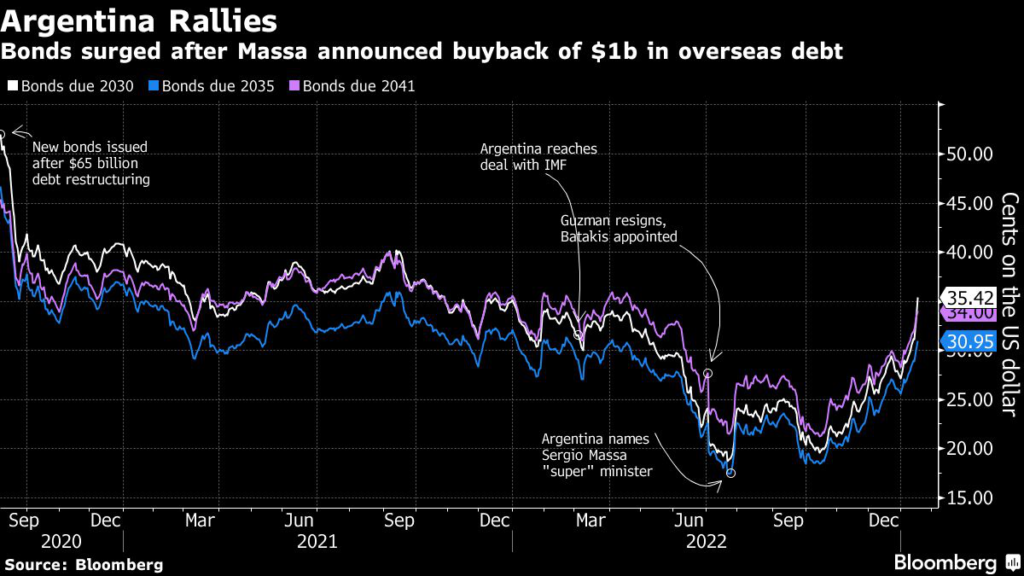Argentina’s plan to repurchase $1 billion of its deeply distressed dollar bonds has emerging-market investors scratching their heads.
(Bloomberg) — Argentina’s plan to repurchase $1 billion of its deeply distressed dollar bonds has emerging-market investors scratching their heads.
Economy Minister Sergio Massa announced the plan Wednesday to buy back securities maturing in 2029 and 2030 trading at 30-some cents on the dollar.
The notes jumped to their highest prices in more than a year after Massa spoke, extending a rally that had already produced 60% returns for investors since October.
While repurchasing the bonds at a fraction of their face value could ultimately save the country hundreds of millions of dollars in interest and principal payments, investors point out that the government doesn’t have very much room in central bank coffers to fund such a lavish buyback.
Argentina’s long-standing financial woes are, of course, partly why the bonds were so cheap in the first place.
The plan makes so little sense that the market gains may be short lived once investors sort through the details, according to Pablo Waldman, a senior strategist at Inviu in Buenos Aires.
“There are very limited resources, and this is a very risky way of deploying them,” Waldman said.
“If they don’t follow through with other measures, the very limited scope of this plan likely won’t cause bonds to rally further.”
Argentina’s $16.1 billion in dollar bonds due 2030 pared gains on Thursday, slipping 0.9 cent to about 34.6 cents on the dollar, as of 1:24pm in Buenos Aires.
The announcement is all the more perplexing because while central bank reserves have climbed in recent months, net reserves are still dangerously low at just over $6 billion, according to local brokerage Portfolio Personal Inversiones.
The nation is under pressure to bolster those reserves to comply with targets laid out in its $44 billion program with the International Monetary Fund, and it’s facing a severe drought that looks set to sap export dollars from flowing into the central bank later this year.
While the Economy Ministry provided few details on the plan, officials are said to be planning to use dollars held by the Treasury to fund the buyback.
Some of the money comes from expectations for lower energy imports in 2023. The Economy Ministry declined to comment.
Some investors are speculating that the buyback plan may be an attempt by the government to appear market friendly ahead of elections in October.
Others guess it could be the first step of a convoluted process to help prop up the peso in unofficial foreign-exchange markets.
Alejo Costa, chief Argentina strategist at BTG Pactual in Buenos Aires, said he thinks it’s most likely a ploy by officials to support the peso, but he doesn’t rule out more purely political motivations.
“The government may think they’re improving market sentiment,” Costa said.
“All Massa knows is politics and rhetoric, and he may believe this rhetoric improves the context ahead of the elections this year.”
A senior economy minister official said the plan seeks to reduce the gap between Argentina’s official and parallel exchange rates.
Argentina’s parallel exchange rate, known locally as the blue-chip swap, weakened to a record 363 pesos per dollar earlier this week.
Argentina’s official exchange rate, held steady by capital controls, weakened 0.2% to around 183 pesos per dollar.
Regardless of Argentina’s motive, investors say the buyback would have been more beneficial to the government if it had taken place last year, when bond prices were even lower.
“I think they are just shouting out loud just to have something on the front pages of the newspaper,” said Joaquin Almeyra, a fixed income trader at Bulltick LLC in Miami.
“It would have made more sense to do this months ago.”
–With assistance from Patrick Gillespie.
(Updates with latest bond prices in the sixth paragraph)
More stories like this are available on bloomberg.com
©2023 Bloomberg L.P.










